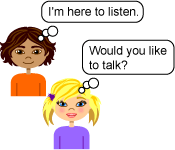|
|
|
|
|
DEPRESSION
Back to top
HOW CAN I TELL IF SOMEONE MIGHT HAVE AN EATING DISORDER?
An eating disorder is a serious and long-lasting illness that impacts the way a person views his or her body, eats, and feels about him or herself. Eating disorders include anorexia, bulimia, and binge eating. Binge eating means you eat a lot of food at once. A person with an eating disorder can be overweight or underweight. Males and females can have eating disorders.
If you are worried about a possible eating disorder in someone you know, here are some key things to look for:
| Change in eating patterns
|
Feeling a lot of shame and guilt after eating
|
| Eating too little
|
Frequent visits to the bathroom after meals
|
| Worries about getting fat
|
Saying things like "I am so fat" or "I am ugly"
|
| Increased/excessive exercising
|
Talking a lot about needing to be on a diet
|
| Taking drug/medication to lose weight
|
Frequent counting calories
|
| Losing one's menstrual period (in girls)
|
Extreme thinness
|
| Vomiting after meals
|
Eating a lot of food in a short period of time
|
 Back to top
Back to top
HOW CAN I ENCOURAGE SOMEONE TO GET HELP?
Helping a friend who may have en eating disorder can be challenging. It's normal to feel many different emotions (overwhelmed, confused, and angry) when you try to help someone, especially if they don't understand that you're trying to help. If your friend wants to talk, listen. Helping a friend does not mean you are responsible for fixing his or her problems. What you can offer is a listening ear. Be supportive and encourage him or her to get help from adults who he or she can talk to. Do not avoid the person. You do not have to have all the answers or be an expert - just be a good listener.
Back to top
WHAT MIGHT BE HELPFUL?
- It is ok to talk to someone and let them know that you have been noticing changes in him or her. Use open-ended questions like "How are things going for you?"
- Talk to an adult you trust. Don't keep your feelings inside.
- Let your friend know that you care about him or her, and are there to list and support, not judge or criticize.
- If you think a friend really needs help, encourage him/her to get help from an adult. Do not try to solve the problem yourself, but instead offer to help with making phone calls or going to appointments.
- Offer your friend choices regarding how to get help, including websites, phone numbers for hotlines, or numbers for helpful adults in school or in the community. National Eating Disorders Association Helpline: 800-931-2237 and www.nationaleatingdisoders.org
- When you are really worried about someone's safety, it is ok to talk to them about it. If you are worried about your friend's safety - ask and listen! Suicide hotline: 1-800-273-TALK
Back to top
WHAT MIGHT NOT BE SO HELPFUL?

- Trying to solve your friend's problem by yourself. This is not helpful for him/her or for you. Seek professional advice and support from a trusted adult.
- Keeping your feelings or worries to yourself
- Keeping secrets about what your friend is doing.
- Ignoring the person
Disclaimer: Material in Whyville's Wellness Center is intended as general information. It is not a recommendation for treatment,
nor should it be considered medical or mental health advice. Whyville's Wellness Center urges families to discuss all information
and questions related to medical or mental health care with a health care professional.
|
|
|
|
|